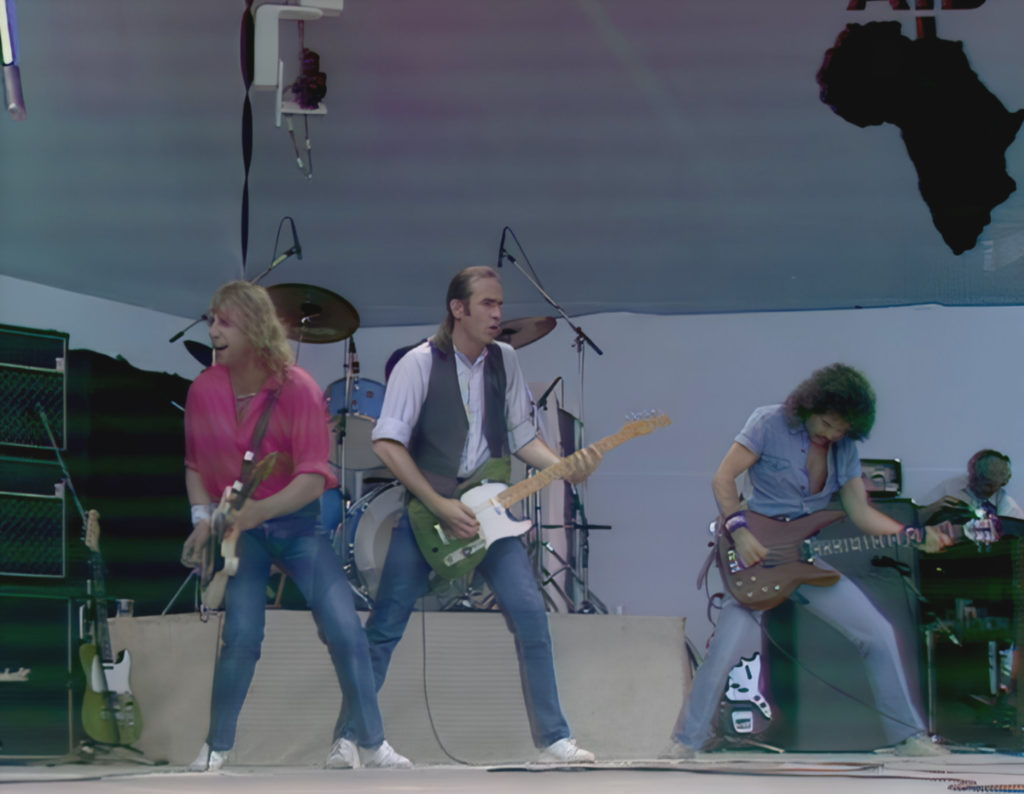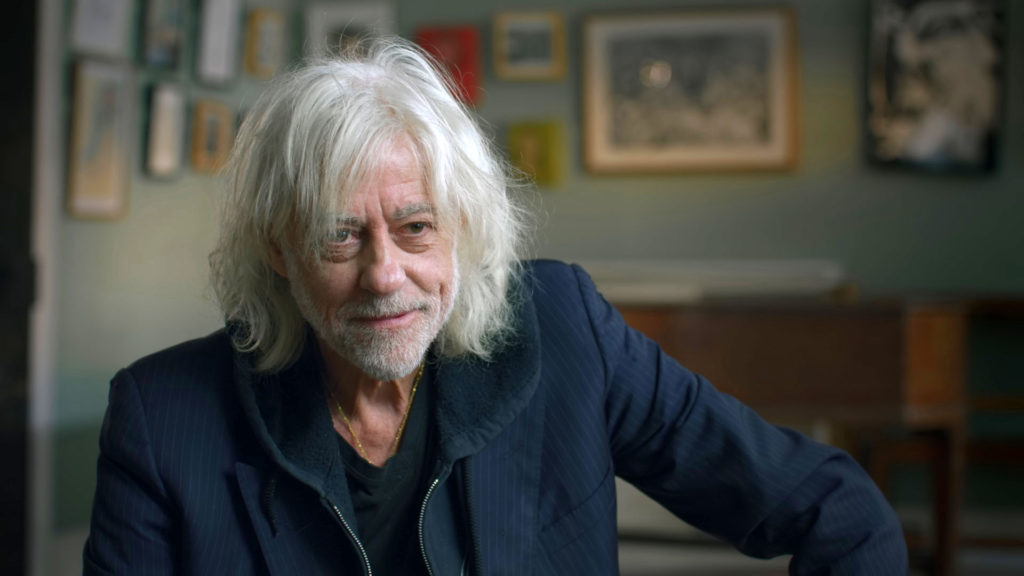THIS autumn, Bob Geldof’s band The Boomtown Rats is celebrating its 50th anniversary with a new tour.
This is unlikely to make international headlines. Never mind, though; for this month the world is celebrating a milestone for which Bob can take more credit than any other person on the planet: the 40th anniversary of Live Aid.
After the success of their Band Aid supergroup single Do they Know it’s Christmas, Bob and Midge Ure came up with an even more ambitious plan: an epic, groundbreaking pair of charity concerts which would see 70 of the world’s greatest artists and bands perform over 16 hours of live music to raise money for the Ethiopian famine crisis.
One concert would be held in London, the other in Philadelphia, both on July 13, 1985.
Live Aid raised £40 million on the day, but this was just the beginning for Bob.
 Status Quo performing Rockin' All Over The World at Live Aid (Pic: Band Aid Licensing Ltd)
Status Quo performing Rockin' All Over The World at Live Aid (Pic: Band Aid Licensing Ltd)He was destined to become the scourge of world leaders, campaigning for everything from the removal of third-world debt to ensuring all the money went to the right places.
To quote Bono: “He’s just impossible to argue with. Bob Geldof is what justice looks like when it runs out of patience."
Spurred on by righteous fury, wild-haired, charming, rude, passionate and ferociously intelligent, Bob redefined the role of the celebrity social crusader.
White saviour complex? You’re a brave man or woman if you plan on getting into that with Bob Geldof. Oh, and don’t ask Bono about it either, or he’ll come back with terrible stuff like “I’m Irish. Bob Geldof is Irish. We would consider ourselves partners [with Africans] from the beginning. It is not a patronising or even paternalistic relationship that we have with our African peers, because we’re Irish. We have the folk memory of famine.”
Whatever your views on Live Aid today, it’s impossible not to marvel at its sheer, massive ambition. It was the largest broadcast event in history, using 13 military satellites to transmit the concert to TVs across the globe. Around two billion people from 15 nations watched the show, on an estimated 84% of the world’s TV sets – an intriguing figure, though surely one that’s impossible to substantiate. For those assembled in Wembley Stadium, it was like England in the World Cup final and Woodstock rolled into one.
The whole thing was organised in just 10 weeks from start to finish.
Let’s take a look at 15 fun facts and memorable moments...
1 The famous Live Aid misquote
Ingrid Bergman never said “Play it again, Sam’; Darth Vader never said “Luke, I am your father”, and Bob Geldof never said “Give us your f*cking money”. What he did say, in response to a TV presenter who seemed absolutely fixated on people posting in their donations, was “F*ck the address, let’s get the numbers”. The ‘numbers’ were duly broadcast and the phone lines went into meltdown
2 That wasn’t down to Queen, though
Legend has it that it was Freddie Mercury’s barnstorming performance that caused the biggest meltdown of the lines, but in fact this came after David Bowie’s set.
Bowie was arguably the biggest star of the night, and was originally lined up to perform three songs. However, once he’d watched the scenes from Ethiopia, he made it a condition of his appearance that they’d cut the third in favour of a screening of the footage. He finished Heroes, introduced the film, 72,000 people at Wembley fell silent and the phone lines lit up.
 Live Aid founder Bob Geldof (PIC: BBC/Brook Lapping)
Live Aid founder Bob Geldof (PIC: BBC/Brook Lapping)3 If you build it, they will come
Bob officially announced the line-up at a press conference four weeks before the concert. The details came as news to many of the acts, who far from confirming their attendance had yet to be asked
4 Colour The Who particularly surprised…
The band had broken up in 1982 and had no plans for reforming. Frontman Roger Daltrey refused to play with drummer Kenney Jones, while bassist John Entwistle refused to not play with Kenney Jones.
In his memoir, The Who’s Pete Townshend accuses Bob of emotional blackmail. “When Bob sensed I might refuse to appear, he took the gloves off...‘Every pound we make will save a life. Do the f*cking math. And do the f*cking show!’”
They did the show, but got their revenge by over-running. When the red warning light flashed at the front of the stage to alert them that their time was up, Pete stomped on it and broke it.
5 What price Oasis?
Given the current dynamic pricing which left some Oasis fans with no change from £355, it’s rather sweet now to watch BBC interviewers marvelling at the long queues for Live Aid tickets – “despite the £25 price tag!” That’s still only £70 in new money.
6 From Crocodile Rock to cater, alligator
Although The Hard Rock Cafe set up a free restaurant backstage, Elton John wasn’t taking any risks. He rocked up with his own motorhome containing a BBQ, cooking sausages, burgers and steaks. He may not have fed the world, but he treated select acquaintances such as David Bowie and Freddy Mercury.
7 Strait outta Wembley
Dire Straits just happened to be playing Wembley Arena on the same day as Live Aid. Their place in the latter’s running order left them with just one hour to get to the Stadium.
The two policewomen enlisted to help the band rush from the Arena had no idea who they were. Legend has it that they informed Wembley security that “these blokes are in dire straits and they need to get out quick”.
8 Something in the Air (literally)
Ah, Phil Collins: the performer none of the younger viewers wanted to see, and they got to see him twice.
Straight after his Wembley set, Phil hopped into a helicopter owned by Noel Edmonds, which took him to Heathrow, from which he flew to New York via Concorde in three and a half hours. When he landed, Cher lent him her limo to get to Philadephia, where he played two of his own ballads before joining Led Zeppelin on drums.
Just imagine: if Phil had been forced to rely on British Rail and Ryanair, Led Zeppelin may not have played the worst gig in its history. The band blamed Phil for not knowing the drum parts, and promptly banned the footage from all future broadcasts.
9 The other Bob didn’t get the memo
Bob Dylan failed to grasp the Live Aid purpose.
“He displayed a complete lack of understanding of the issues raised by Live Aid by saying, unforgivably, 'It would be nice if some of this money went to the American farmers’." Bob Geldof wrote in his memoirs.
“Live Aid was about people losing their lives. There is a radical difference between losing your livelihood and losing your life. It did instigate Farm Aid, which was a good thing in itself but it was a crass, stupid, nationalistic thing to say.”
He also described Dylan’s performance as “catastrophic” and “the biggest disappointment of the evening”.
Bobby D on classic crowd-pleasing form all round, then.
10 Any other disasters?
Not exactly, though Bob Geldof was said to be furious (he doesn’t really do ‘mildly annoyed’, does he?) that instead of belting out rousing, donation-extracting bangers, some performers used Live Aid as an opportunity to plug their latest singles. Ironically, it was those who got with the programme and played their old hits who went on to enjoy the biggest career boost from the show.
In contrast, after performing his new song Vive Le Rock, Adam Ant gloomily watched it peak at No 50 in the charts. Should have unplugged the jukebox and given us Ant Music, Adam!
11 God save the Queen!
Queen were louder, better and more magnetic than any other band that day. Already stadium-playing royalty, they knew exactly how to adjust their PA system so that Freddie’s powerful voice reached the furthest edges of the crowd; added to this, the band had spent the previous three days in a studio perfecting their performance.
Not originally a fan of Queen’s brand of operatic pop, Bob has since named them the best act of the 16-hour show. Certainly there was no more theatrical sight than Freddie pumping his mic stand across the stage while 72,000 pairs of hands double-clapped in perfect synchronicity to Radio Ga Ga.
12 And god bless Status Quo
Ah, the Quo – always guaranteed to inject a bit of laddish fun into proceedings. After locking Spandau Ballet into the loo as a jape during the Band Aid recording, Rick Parfitt and Francis Rossi turned up slightly jaded at Live Aid after partying heavily the night before.
Hungover, perhaps, but not hung up on themselves. “Nobody want[ed] to go on first”, Francis told The Mirror. “There were lots of egos. I said we would gladly go on first because everybody was arguing.”
After a performance from the Coldstream Guards, the Quo marched on stage, Francis shouted “You alright?” and kicked off with Rocking all over the World. In hindsight, of course, it was the perfect choice.
13 When Bono went Bad
Bono sorely tested his fellow bandmates’ patience when he jumped off stage during a performance of Bad to retrieve a girl in the crowd. This slightly bizarre stunt obliged the rest of the band to carry on jamming for what seemed like forever; it also meant they had to cut Pride (In the Name of Love), their biggest hit at the time.
This, however, is not why Bono can’t bear to rewatch his performance. “It was such a bad hair day,” he says. “One of your most famous moments of your life … and you’ve got a mullet”. Not just any mullet, either, but arguably the worst mullet in history.
Funnily enough, in an interview before the show Bono is wearing the leprechaun-style hat he favoured at the time, but he doesn’t seem to find this mortifying at all.
14 Dressed Like a Virgin
Shortly before Live Aid, nude photos of Madonna had been published in Penthouse magazine. Introducing her on stage at Philly, Bette Midler made a rather heavy-handed, nudge-nudge-wink-wink allusion to this, to which the future Queen of Pop firmly responded,
“I ain’t taking shit off today”.
Madonna 1, Bette Midler nil, along with permanent banishment from the sisterhood.
15 And finally – yes, actually, they did know it was Christmas time after all
Following Band Aid’s Do they Know its Christmas, Bob Geldof came in for implying that Ethiopia was a stranger to Christianity, whereas in fact it’s its biggest religion. He was duly punished for this gaffe during his first visit to the country, when he was forced to spend a whole night in a church while Ethiopians celebrated Christmas Eve.
“This bloody thing, going on for 14 hours. I mean, the mass in Ireland bored the arse off me. I knocked that on the head as soon as I could”, he said.
Happy 40th Live Aid anniversary, Bob.
The story of the concerts and their aftermath are covered by the BBC’s new three-part documentary Live Aid at 40: When Rock ’n’ Roll Took on the World, now on BBC iPlayer along with over six hours of concert footage

